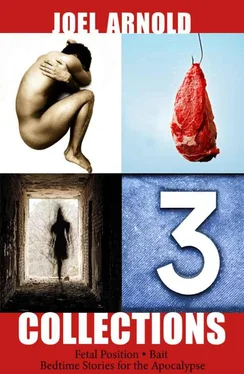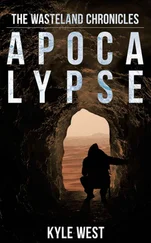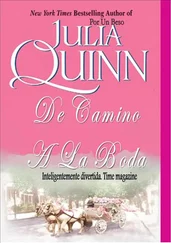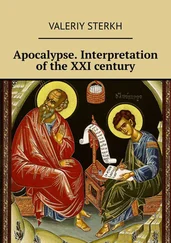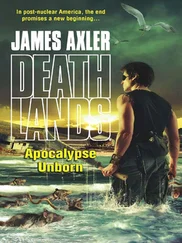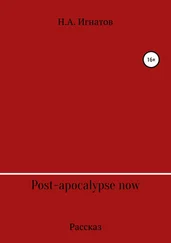Amidst the rubble, something winked at him in the weak cone of his helmet’s light. He reached down, but stopped short. It was a copper penny. He looked behind him into the tunnel’s dark throat. He waited, straining to listen above the sound of his own breathing.
You can never be too careful. That’s what his grandmother always told him. They’re always watching, Clay. Always listening. And she was right. How else could they know where to find you, to dole out their pitiful ration of food, have it delivered to within ten feet of where you toiled? Their little rusty-can robots on squeaky wheels, the food tray balanced on top of their short squat bodies, and if the food spills on its way to you, that’s your own tough luck. Another good reason not to dig at too sharp of an angle. If the damn things have to find you on a steep upsweep, half your food’s going to be soaking into the ground, soaking into the upturned bony mouths of the hundreds of skulls that lined the tunnel floors.
He squatted over the penny, pretending to dig at a phantom stone in his boot, then quickly slid the penny between the boot’s hard leather, and his own callused skin. He stood.
You can never be too careful.
He filled his cart with the bony detritus hewn from the tunnel. Pressed a button on the cart that signaled another worker, another Player-of-the-Game, to bring an emptied cart and haul the full one away.
There’s always someone lower than you, he thought. Always someone worth less no matter how worthless you are.
He heard steps coming toward him, the dull crunch of hard boot rubber on old bone. He didn’t turn around to look. What if it was one of them, one of the enforcers sent to terminate his play? Had they seen him take the penny?
The light from another helmet threw Clay’s shadow flat against the tunnel wall. If he had been caught, if it was time to leave the game, he didn’t want to see it coming.
He felt a presence behind him, waiting. Clay stared straight ahead. Lifted his dull pick and swung at his own shadow. It struck weakly against solid bone.
Get it over with, he thought, the back of his neck hot in the glare of the other light. But there was only the receding squeak of the cart’s wheels as it was hauled away.
His shoulders sagged. The smell of his own sweat, the feel of heat prickling his face, overwhelmed him. He wanted to drop to the ground and sleep until the game was over. Sleep until the sun engulfed the planet. The sleep of eternity. He often envied the previous owners of the bones he picked through.
But he heard his grandmother’s voice again. The last words she said to him before he was swallowed up in the tunnel’s maw.
“ We’re not quitters, Clay. Don’t you ever give up.”
He rolled his shoulders back. Let the tears flow down his dirt caked cheeks. He took a deep breath, the dust-filled oxygen like glass shards in his lungs. He swung his arm, the pick bouncing impotently off the mass of bone in front of him. But he forced himself to keep swinging.
“ Did you hear it? Eddie made it out.”
Rumors.
“ Hey, did you know — Frank broke through.”
The miners thrived on them.
“ They’re sending people down from above to show us the way out. They’re going to help us. They’re actually going to help us out of this goddamn mess!”
Rumors of the sunlight above, of how far they had come, of how close they were to the surface. The rumors gave them hope. Yet the rumors could kill. There were times they stirred a man’s heart past the point of acceptance, shook it up until he couldn’t take it any more, and he had to get to the surface right the fuck now . He’d dig like a madman, burrowing up through the dirt at a dangerous angle, not paying attention to the intricacies, the textures of the earth. More often than not he’d become trapped. The earth, the bones, would cave in around him, crushing him, jamming his fingernails, his teeth, his eyes full of countless generations of the dead.
Clay ignored the rumors as best he could. What good were they? If he was near the surface, he’d find out soon enough, rumor or not. Best not to let glimmers of false hope lead to pain and agony further down the line.
He believed that the only way out was to work methodically. Dig slowly, carefully, consistently. Eventually, his pick would break through the surface and the fresh air would fill his lungs, the sun fill his heart.
“ I know your father.”
The voice arrived at Clay’s ear like one of the many insects that scurried about down here. Clay continued to face the wall of bone and dirt, his heart quickening.
The stranger was only inches away, his breath painful in Clay’s ear. “He made it out. I saw him on the outside.”
Clay struck his pick hard in the conglomerate before him, hard enough to make his hands go numb and his wrists scream with pain. He let go of the pick and stepped back, the metal tip deeply embedded, the wooden handle vibrating with the force of the blow. He wiped the sweat from his face, tried to keep his breathing under control.
“Who are you?” he asked, his voice quiet and hoarse from disuse. He knew they sent spies down here to gather information and tempt the miners to lose their cool. “How do you know who I am?”
“He sent me down to find you.”
“You’re full of shit.”
“No. It’s true. He made it out.”
“You didn’t answer my question. How do you know who I am?”
The man took a step back, looking Clay up and down. “You think I wanted to come back down here? You think I’m enjoying this?”
“You’re not a miner?”
“Don’t you get it? He made it out. He won.”
Clay studied the man. A light tan, a lack of calluses. The dirt on his face was only surface dirt, not deeply ingrained in the wrinkles and pores.
“Shit, kid. What’s your problem? I thought you’d be pissing yourself with joy right now.”
Clay turned away from him.
You can never be too careful.
“Wait.” The man pulled a small gray envelope from his shirt pocket. He opened it and slid out a photograph. “Here. Take it.”
Clay turned. His fingers trembled when he touched it. He slumped forward, grabbing onto the handle of the pick, still protruding from the mine’s wall, for support. It was a picture of his father. Standing on the surface. Squinting from the sun. Even though Clay hadn’t seen his father for five years, he knew the picture was recent, knew it couldn’t have been taken before his father was sent into the mines. He looked older. Deep wrinkles. Hair gray and balding.
“Why didn’t he come himself?”
“Are you kidding? It took him four years to get out. You think he’d want to come back here, risk getting lost? Maybe he thinks I’m full of shit when I tell him I know where you are. Maybe he thinks it’s a trick to get him back into the mines.”
Clay couldn’t take his eyes off the photograph. Tears made pink slash marks through the dirt on his face. “How do I know this isn’t a trick?”
“Can’t help you with that, kid. That’s up to you to decide.” He pulled a piece of paper from his pocket. On it was drawn a map. “Here’s where we are now,” he said, pointing. “And here’s where you wanna go.” He traced his finger through a convoluted maze of tunnels, criss-crossing and switching back on each other, all rising steadily to the surface. “Once you’re in this area, you can dig your way out. That’s the main thing, kid. You still gotta dig yourself out. Otherwise, if you follow me on up to the main entrance, they’ll cry foul and toss your skinny ass back down to the bottom.”
Clay took the map. Studied it. Used his fingernail to mark his current location.
Читать дальше
